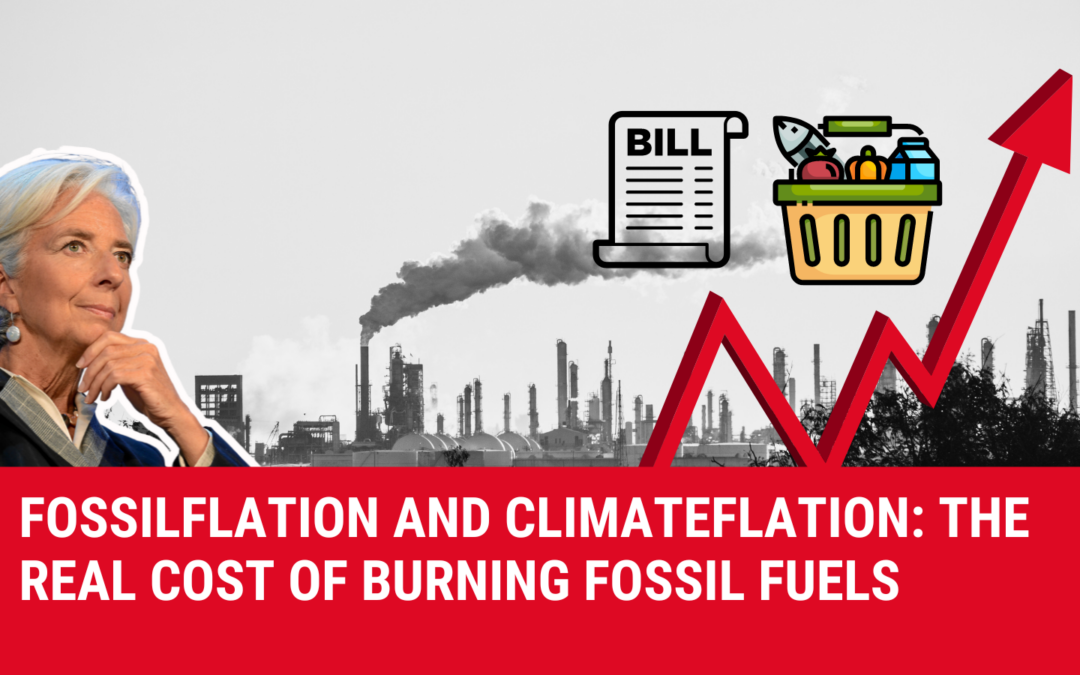Maybe you are wondering why food and energy prices are going up so fast in Europe this year, and what the real cause of inflation is. The truth behind the current cost of living crisis is our dangerous dependence on fossil fuels, which has become more and more clear after Russia’s invasion of Ukraine. Climate change causes increasing price fluctuations, especially with regard to food. In this blog we explain what fossilflation and climateflation are, and what the connections between fossil fuels, the rising of our energy bills and price increases in general are.
The costs of food, fuel and energy bills are out of control, but it seems that governments and institutions are refusing to do something that will keep prices down for good.
The source of this surge in costs has been widely discussed, and the broad consensus is that a jump in energy demand as the world came out of pandemic-induced lockdowns put a strain on supply, which in turn pushed prices up. However, it was Russia’s subsequent invasion of Ukraine that really broke the bank, with sanctions against Russia marking an end to our imports of oil and gas from one of the world’s largest producers of both.
Implicit in this story is the idea that these price pressures were unavoidable, and essentially a product of an increasingly globalised world.
But what if we looked beyond this surface narrative? We would uncover the root cause of the current cost of living crisis: a dangerous dependence on fossil fuels whose prices are unpredictable, and which are uncontrollable at a national level, due to the international nature of their pricing. We call the effects of this dependence fossilflation, because it’s precisely this overreliance on fossil fuels that is stoking inflation.
You may well ask: what is fossilflation?
Fossilflation is where food and energy prices go up because our whole system depends on fossil fuels like oil and gas, which are both dangerous for the environment and unpredictable with regard to costs.
Now, due to Russia’s ongoing occupation of Ukraine, the most obvious example of fossilflation is war breaking out between one or more fossil fuel producing countries, and the ensuing global response (in this case, sanctions) driving the price of those fuels up. Yet some instances of fossilflation are entirely environmental: think the bursting of the Nord Stream gas pipeline last year, which caused gas prices to spike by 30%.
Other cases of fossilflation are not only man-made, but made by design. Just this month, the Organisation of Petroleum Exporting Countries (OPEC+) decided to cut oil production so that demand would outpace supply — a move engineered to send prices soaring. It did just that. Overnight, in fact.
Another aspect with regard to fossilflation is the role that profiteering, more generally, has played in recent inflationary growth. This is an issue that central banks are increasingly recognising, and the European Central Bank (ECB) recently released research showing the effect of profits on price pressures in 2022.
Fossilflation is not a phenomenon that stands alone. Another dramatic effect of the climate crisis we are facing is climateflation, which is the greater driver of rising food prices. Climateflation means that prices go up because events like droughts cause crop shortages, and these in turn lead to price hikes. The examples are plentiful: droughts devastating Italian rice crops, Argentinian soybean yields, Spanish olive oil production, and American corn and wheat. New research even points to a surge in plant pandemics caused by rising temperatures. But it’s not just droughts doing the damage, wildfires and heavy rains threaten vineyards, unseasonal hailstorms have destroyed wheat in India (the world’s second-largest producer of the crop), whilst frosts have killed American apples and Brazilian coffee. Even meat availability has been impacted, with farmers unable to produce feed for their livestock.
Our new videos expose how fossil fuels and climate change are making life miserable for all of us and why we need to redirect our whole system towards renewables to protect people and our planet — not profit.
It’s not a mystery that to truly reclaim control, we have to switch to renewable energy.
We want to show that cheaper, greener alternatives such as solar and wind are well within our reach — but we need to come together to apply pressure on the ECB and governments to cut our ties with fossil fuels once and for all.
That’s why we’re calling on the European Central Bank to stop fossilflation and climateflation, so that we can bring down prices and protect the planet. Together, let’s expose the truth behind the cost of living scandal and show that a fairer, greener future is possible.

